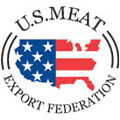 U.S. pork exports for the first 11 months of 2012 continued to exceed the record-setting pace of 2011, the value of beef exports remained slightly above 2011’s record levels despite continued lower volumes and the value of lamb exports in November bounced back from an otherwise slow year, according to statistics released by USDA and compiled by the U.S. Meat Export Federation (USMEF).
U.S. pork exports for the first 11 months of 2012 continued to exceed the record-setting pace of 2011, the value of beef exports remained slightly above 2011’s record levels despite continued lower volumes and the value of lamb exports in November bounced back from an otherwise slow year, according to statistics released by USDA and compiled by the U.S. Meat Export Federation (USMEF).
With only one month yet to be recorded for 2012, pork exports continue to top 2011 levels by 2 percent in volume (2,075,974 mt) and 5 percent in value ($5.8 billion), while totals for November declined 7.7 percent in volume and 5.4 percent in value versus last year. It is important to note, however, that November 2011 ranks as the second-best month in history (behind October 2012) for U.S. pork exports.

Mexico continues to perform as the United States’ top pork volume destination, with November’s totals up 7.2 percent in volume and 4.6 percent in value, pushing the 11-month totals to 550,408 mt (up 15 percent) valued at just over $1 billion (up 11 percent).
Although exports to Japan are trailing 2011 volume, they could still eclipse the $2 billion mark this year, with value up 3 percent through November and volume down 6 percent.
Other top pork markets in November were Canada (up 15.3 percent in volume and 17.1 percent in value), South Korea (up 26.4 percent in volume and 8.5 percent in value), Russia (up 100 percent in volume and 78.7 percent in value), and Central/South America (up 21.1 percent in volume and 10 percent in value).
With U.S. production declining in 2012, beef exports fell a modest 1 percent in value on a 13.3 percent drop in volume in November. For the year, volumes are down 11 percent (1,043,151 mt) but the value of those exports is $5.05 billion – still 2 percent above the record-setting value pace of 2011.
Canada (up 18.5 percent in volume and 37.8 percent in value), Hong Kong (up 18.8 percent and 62.6 percent in volume and value, respectively), Russia (up 19 percent in volume and 4 percent in value) and Central/South America (up 42.4 percent in volume and 56.3 percent in value; including record exports to Chile, up 119 percent) were the top-performing beef export markets in November. Export value to South Korea increased nearly 6 percent on a slight decline in volume.
“Volume has been an issue for beef exports all year,” noted USMEF President and CEO Philip Seng. “That continued in November, but an appreciated value of those products has helped the industry hold its own in a challenging year.”
Beef exports to price-sensitive markets like Mexico are down this year, but the value of exports to premium markets like Japan (up 19 percent for the year) and Canada (up 13 percent) continue to grow even as volumes remain low.
Another positive for beef exporters is the rebound of the Taiwan market, which was once a top five U.S. beef export market but was hindered for most of this year by ractopamine-related barriers that have since been resolved. In November, the value of beef sales to Taiwan jumped 13.7 percent over last year on slightly reduced volumes. For the year, exports to Taiwan are down 48 percent in volume and 40 percent in value, but recent numbers are encouraging for 2013. Pork exports to Taiwan, however, continue to be affected by Taiwanese restrictions on products with ractopamine residues.
“There is no question that rising production costs and slowing economic growth have kept buyers on the sidelines or moved them toward less expensive options,” said Seng. He noted that higher domestic meat production in certain markets (such as Korea, Japan and China) also have affected exports this year. Market access issues – such as Indonesia’s tighter import quotas aimed at boosting domestic production and Saudi Arabia’s closure due to BSE – have also impacted exports.
“While volumes are lower, the quality and reputation of U.S. red meat products have helped support higher values, and that is not a statement that most of our competitors in the international marketplace can make,” he said.
Year-to-date, U.S. pork exports account for 27 percent of total production (23.5 percent for just muscle cuts) and the per-head export value is $56.12 – up 3 percent from last year. Beef exports account for 12.6 percent of total production (9.8 percent for just muscle cuts) with a per-head value of $214.64, up 5 percent from last year.
The value of exports was the positive news for the U.S. lamb industry in November. The volume of American lamb sales internationally has been down throughout the year: declining 27 percent for the first 11 months and 22.3 percent in November. While the value of those exports also has been down for the year (-13 percent), it jumped 12.4 percent in November on the strength of strong sales to the top lamb export market, Mexico.

January 11, 2013 - USMEF


